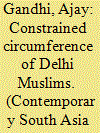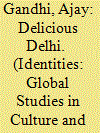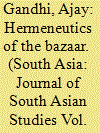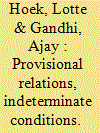|
|
|
Sort Order |
|
|
|
Items / Page
|
|
|
|
|
|
|
| Srl | Item |
| 1 |
ID:
167253


|
|
|
|
|
| Summary/Abstract |
This article is part of a Book Forum review of Ghazala Jamil’s book Accumulation by Segregation (2017). The Book Forum consists of individual commentaries on this text by four interested scholars, followed by a response by the author. The article may be read individually or alongside the other contributions to the Forum, which together constitute a comprehensive discussion of the themes and arguments in the book.
|
|
|
|
|
|
|
|
|
|
|
|
|
|
|
|
| 2 |
ID:
144172


|
|
|
|
|
| Summary/Abstract |
This article examines how Old Delhi is represented and recreated in contemporary India. Delhi’s old city was once the locus of pre-colonial Mughal sovereignty. It is now often encountered via nationalist spectacles, mass-media images and consumption practices. Paralleling neo-liberalism’s onset in the 1990s, its street food, bazaar spaces and historical monuments have been avidly appropriated by reigning institutions and classes. Old Delhi suggests that which the new India has left behind; yet this displacement also elicits longing for what has been lost.
This medieval remnant can therefore be considered the site of nostalgia consumed by a globalised middle class. This article presents an ethnography of Old Delhi’s invocation in New Delhi’s cultural landscape, including malls, newspapers, heritage sites, hotels, and food courts. In triangulating among the realms of nationalist nostalgia, middle-class identity and mediated consumption, it emphasises how India’s neoliberal emergence is bound up with the co-opting of the past.
|
|
|
|
|
|
|
|
|
|
|
|
|
|
|
|
| 3 |
ID:
144363


|
|
|
|
|
| Summary/Abstract |
This paper presents an ethnographic study of a redevelopment controversy in Delhi's old city. It considers the perspectives of traders, hawkers, politicians and officials on the proposed revamping of the Meena Bazaar. The paper illustrates how hermeneutic and aesthetic dimensions suffuse public and political life in India. Specifically, sincere intentions, evoked in speech and performance, are seen as a prerequisite of public presentation and as a locus of interpretive scrutiny. In an ambiguous and indeterminate milieu, promises and motives are probingly assessed, often in ironic and dramaturgical form. The paper foregrounds the ‘hermeneutics of the bazaar’, an interpretive sensitivity to intentionality, and ‘structured sincerity’, the efficacy, and reflexive steering, of performed conviction.
|
|
|
|
|
|
|
|
|
|
|
|
|
|
|
|
| 4 |
ID:
144359


|
|
|
|
|
| Summary/Abstract |
In the introduction to this special section, we present six ethnographic articles that explore the sites and forms of ‘non-sociological sociality’ in South Asia. Set in urban spaces where the familiar vectors of relations, such as ethnicity, class, gender or age, may be attenuated, the articles examine how social and political entanglement is suffused with ambiguity, indeterminacy, provisionality and contingency. In these sites, opaque conditions, open-ended play, double meanings and interpretive scrutiny abound. Spaces such as the racecourse, the bazaar, the university campus or the nocturnal street suggest undetermined conditions and fleeting collaborations which have a wider bearing on cross-cutting forms of sociality in South Asia.
|
|
|
|
|
|
|
|
|
|
|
|
|
|
|
|
|
|
|
|
|